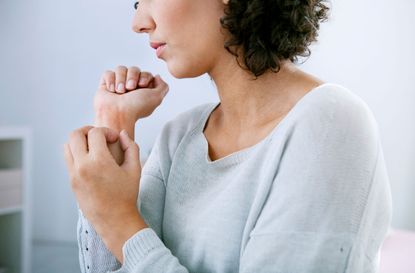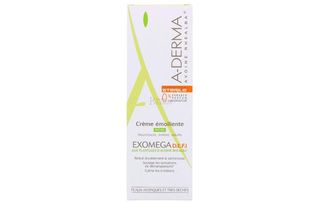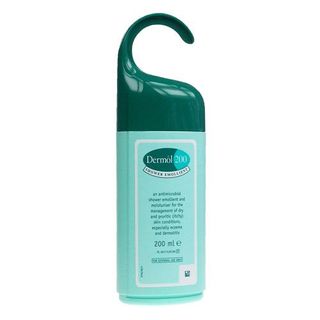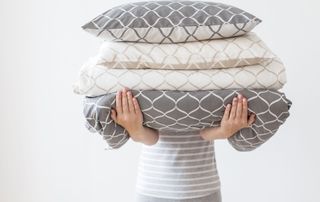What is eczema? Common causes of eczema and how to treat it
In the UK, one in five children and one in 12 adults have eczema, but what can you do to beat the symptoms if you're a sufferer?


Eczema affects one in five kids and one in 12 adults in the UK, and for those who do suffer, it can result in itchy, dry, red, sore and cracked skin, which can even lead to bleeding.
Our skin is made up of oils and fats that keep it strong, making a barrier against harmful bacteria. Healthy skin cells are plumped up with a balance of water, oils and fats and when that balance becomes upset the barrier becomes broken. Eczema happens when your skin does not produce the right amount of fats and oils to keep the barrier strong and as it becomes dehydrated it cracks and opens.
Eczema is commonly seen where the skin folds, such as behind knees, inside elbows, around eyes and ears and on the side of the neck. The triggers for eczema range from person to person, but common causes are asthma, hayfever or hereditary. Eczema is not contagious so you can't catch it from anyone else, but it could be passed on from someone in your family.
Unfortunately, there is no proven cure for eczema or childhood eczema. But, as it's such a common condition, there are many products and home remedies you can try to soothe it - as well as skin moisturisers and hand creams for dry skin. As everyone is different there is no one definite answer to healing your sore skin or scalp, and what works for one person may not for another, but below you will find some of the most comment treatments out there.
How to ease eczema itching and dry skin
1. Avoid too much dairy or eggs
It's not a good idea to cut anything out of your diet completely, but dairy and eggs have been linked to triggering eczema so cutting back could see some improvement for you. GoodtoKnow mum Alishah told us, 'Dairy is one of the things that particularly flares up my daughters eczema'. Talk to your GP about eating less of these foods and be careful about restricting these protein and dairy sources in a child's diet. Cutting down on too much dairy could help.
2. Keep your skin moist
The drier your skin gets, the more irritated it will become and make you scratch. Keeping it moist will help combat the dryness but also keep it flexible and help prevent cracks in the skin. Something as simple as having a soak in the bath will relieve your eczema, as water is absorbed into your skin.
Using an emollient is a really good idea. An emollient is basically a more oily type of moisturiser and is not for cosmetic use. They can come in the form of a cream, ointment, lotion or a gel, and for people with mild eczema they might be all you need to keep it under control. Apply at least 3 times a day to the affected areas to keep them moist and supple.
GoodtoKnow Newsletter
Parenting advice, hot topics, best buys and family finance tips delivered straight to your inbox.

A-DERMA's EXOMEGA Emollient Cream is designed to help very dry and eczema prone skin
Tip: Emollients are best used straight after bathing or showering when your skin is already wet.
3. Using the right washing products
Soap dries out the skin very quickly and is bad for people with eczema. Hands are affected particularly because people wash them more often, so eczema sufferers should avoid soap altogether. This includes liquid soaps, shower gel and bubble bath which all dry out skin and potentially cause itching.

You can buy emollient soap substitutes, such as Oilatum soap or Dermol Shower Emollient, which work by allowing the water to get through the skin and then sealing it in with a protective barrier.
Soap can be a nightmare for eczema sufferers. Try a soap substitute in the shower, like Dermol 200 Shower Emollient
Tip: If your child has eczema, try to get them in the bath every day for at least 10-20 minutes using a suitable emollient soap, to hydrate their skin.
4. Steer clear of wool and man-made fabrics and choose cotton
Both wool and materials such as polyester, nylon and rayon can irritate your skin and cause itching, so make sure you use cotton bedding and try to avoid your skin coming into contact with synthetic fabrics. As well as avoiding irritating materials, make sure your laundry products are suitable for sensitive skin. Stick to non-bio washing powders as these are free of enzymes which some people find irritate their skin.

5. Steroids
If your eczema is really making you or your child suffer, your GP can give you topical steroids. Many people avoid steroids because of the risk of side effects, but they are really effective at getting eczema under control quickly. The steroid is applied directly to the skin during a flare-up, which quickly reduces itching and soreness, giving skin the chance to mend. They are good for a short term solution to heal the skin, then afterwards you can use emollients again. Side effects will be explained by your doctor.
Ask your GP about topical steroids, as they can be great at getting eczema under control quickly
6. De-stress
Stress does not cause eczema, but a sufferer may have developed habitual scratching when stressed as they associate scratching their eczema with the relief it provides. Try to set aside some time everyday in which you can relax, watch some telly or have a bath. Think about the times when you scratch. Do you tend to scratch more when you feel stressed? If so, try to resist the urge to scratch (as hard as it may be!) as much as you can. Many sufferers find themselves trapped in the itch-scratch cycle, the more you scratch, the more irritated your skin is, and then you itch more!
If you find yourself scratching more when you're stressed, do whatever you can to take your mind off it! Another way to stop yourself from scratching is to use a specially-developed cream for severe dry skin conditions like eczema. Avene's XeraCalm A.D lipid-replenishing cream works to soothe and nourish your sore damaged skin whilst relieving itching in the meantime. Genius!
7. Keep nails short
Having long nails may look nice but it is far worse for your eczema. Keeping your nails short means that when you do scratch, you don't do so much damage to your skin, particularly as lots of scratching happens during the night, when you don't know you're doing it! If your child has eczema, make sure you keep their nails short and clean, as to avoid infecting the skin when they scratch.
Tip: Keeping hands covered at night can help reduce the damage you do scratching in your sleep. If your child has eczema, try putting cotton socks or gloves over their hands at bedtime.
8. Try natural oils
Moisturising is the most important part of treating eczema and an alternative to shop-bought moisturising products is using natural oils. The most effective oils to use, told us by GoodtoKnow mums are coconut oil, sunflower oil, almond oil or Argan oil. You can either rub them straight into your inflamed areas or find products that use them as a primary ingredient.
9. Stop bathing
Okay, maybe not completely! Although having a warm, bubble bath sounds like a soothing idea, bathing can dry out your skin and the more you do it, the drier your skin gets. Try limiting the time you spend in the shower or bath, and avoiding getting inflamed areas of skin wet too often.
10. Use honey
Honey has many healing properties, having been used for medicinal purposes for years and, due to its soothing nature, a little bit dabbed on eczema could help. It is an anti-inflammatory and helps to repair broken skin so perfect for cracking eczema. Obviously honey is pretty sticky, so use sparingly on small areas and bandage up to stop it spreading all over the house.

Grace Walsh is a health and wellbeing writer, working across the subjects of family, relationships, and LGBT topics, as well as sleep and mental health. A digital journalist with over six years experience as a writer and editor for UK publications, Grace is currently Health Editor for womanandhome.com and has also worked with Cosmopolitan, Red, The i Paper, GoodtoKnow, and more. After graduating from the University of Warwick, she started her career writing about the complexities of sex and relationships, before combining personal hobbies with professional and writing about fitness.
-
 Worried about your teen 'being smelly'? They can't help it, according to scientists, and help is on its way to ease the problem
Worried about your teen 'being smelly'? They can't help it, according to scientists, and help is on its way to ease the problemWe know that puberty can cause all sorts of smells to emanate from teens - now scientists have revealed exactly what you're smelling, and how evolution contributed.
By Lucy Wigley Published
-
 Parenting coach shares 4 'powerful' reframes to try next time it feels like your kid is pushing all your buttons (and #4 is a game changer)
Parenting coach shares 4 'powerful' reframes to try next time it feels like your kid is pushing all your buttons (and #4 is a game changer)A parenting coach has shared four ways parents can reframe their thoughts when their kid has big emotions. Giving them a try could offer big results in little time.
By Lucy Wigley Published